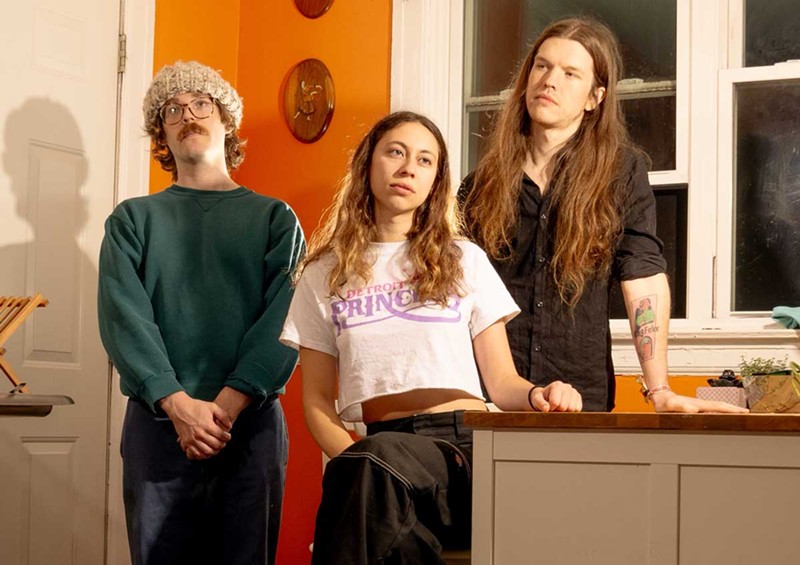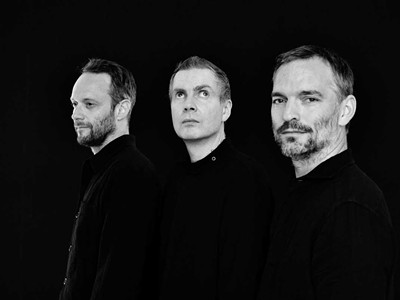“I think an argument could be made that we’re at the early stages of the cyborg era,” says Summer Krinsky. The Detroit-based multi-instrumentalist, songwriter, composer, and producer is beginning to illustrate the uncanny qualities of her music under the moniker of Summer Like The Season, as it blends organic and acoustic elements like found sounds, field recordings, violin, and piano with inherently chillier, even robotic musical entities like synthesizers and the cutting edge sequencer known as an MPC which, to put it a bit reductively, is an evolved drum machine.
It’s as though each song is a sonic, lyrical, and textural mediation between human and machine.
“Cyborgs,” Krinsky continues, “are these partially analog, partially continuous forms but also partially a digital discrete interface. So, I try to make music that blends these tonalities and these different soundscapes. What I’m trying to achieve when writing music is capturing what it means to be living in this present moment, and a huge part of what makes this time and place unique is that we’re in this cyborg-transitional period.” She admits that the various devices of the 21st century may not yet be embedded under our skin, “but still,” she says, “how far are you, really, from your phone at any given time?”
Summer Like The Season’s music stimulates the senses with soundscapes that epitomize composed chaos; we mean this in the best way possible when we say that you wouldn’t necessarily put on a Summer Like The Season song if you wanted to relax. But there is always something captivating to keep you locked in, even as your adrenaline steadily rises while listening.
Summer’s brain
Essentially, this is what you might call experimental electronica that weaves in elements of art-pop and indie rock. And while an SLTS track might not sound like your cup of tea, at first, it’s the kind of magically weird music that will have you spellbound once you’ve had a second cup.
“The music that’s captured my attention the most,” Krinsky says, “has been music that almost, on first listen, makes me a little angry — but then I come back to it over and over, and it turns into my favorite album.” She namechecks Kate Bush, Björk, Radiohead, and Tune-Yards in this regard. “I aspired to make my own version — not to copy those singular artistic voices or to make something that’s derivative, but to make something that sounds like… Summer Krinsky’s brain!”
If it sounds like Krinsky has a somewhat scholarly, philosophic, or even existential approach and mindset, then it might not surprise you that she was awarded a Kresge Fellowship back in 2022 as an emerging artist but that she also holds a Bachelor’s in Performing Arts Technology from the U-M School of Music. It might also not surprise you that such a musical mind has been performing and writing music since she was 13 years old, but she started learning to play instruments at an even younger age.
“I started playing my first instrument before I could really even form memories,” Krinsky says. “Both my parents are piano teachers, so I started with classical piano. And there was just so much music around me in the house, growing up, as I studied.”
She picked up the guitar and bass at 13 and joined her first band when she was in middle school. Even though she wasn’t singing yet, Krinsky still wrote songs, lyrics, and melodies for the bands she played in throughout her formative years. This resulted in her developing a fascination “with recording, production, mixing, and figuring out how to create space in the digital world — how to translate a full sound that happens in the real world to sound not only as good but even better in the digital space, to be almost like a simultaneously hyper-real and surreal place where the laws of what could be played by a person are no longer in place, and layering them in a way that’s just not possible in the 3-D world we live in…”
Sweet, yet biting
The “thing,” though, that Summer struggled to “translate” to what she wanted, as far as sound, was the “drums,” which is primarily why she then started studying and eventually mastering that instrument. “In my early 20s, I moved to Detroit, locked myself in a basement, and just played drums for hours,” she says. In fact, she says the “10,000 hours” adage, be it cliché or not, is totally true — applying not only to her study of the drums but also to doing all her own recording, and eventually it applied to her singing voice, too.
We’ve been employing synonyms for “unique” throughout this article. Still, perhaps the most unique quality of a Summer Like The Season song is her voice, which can be equal parts angel and alien, hitting and sustaining these impossibly elastic pitches that sound like something a NASA probe might have captured while floating through a distant nebula.
“I’d been the composer in projects — I’d been writing songs since middle school — but I was never a lead vocalist,” she says. “I always thought my voice had an ugly quality to it until I started singing harmonies, which was a big leap. Somehow, it had never before occurred to me that, just like all other instruments, I could improve at singing through practice. Once I finally practiced singing, I learned there was this huge range — there was something really special about my voice that I could go to these dark and gritty places and have this cutting tone while also being able to locate sweeter, almost operatic sounds. I found musicality in the parts of my voice that I didn’t like and found this sweet-yet-biting sound that was very unique.”
The live iteration of Summer Like The Season is inevitably different but also wholly unique: Summer simultaneously plays drums and sings lead vocals while her longtime collaborator (and fellow sound engineer) Scott Murphy provides synth, violin, and also manipulates that versatile sequencer known as the MPC. Murphy met Krinsky back in 2017 while they were both working sound together at the Tangent Gallery; he’s been in the band ever since. Liam McNitt, a singer-songwriter and guitarist of the band Legume, joined in 2021, rounding out the group as a tight trio, providing dynamic and scintillating guitar accompaniments for live performances.
“Scott has this incredible understanding of the MPC as an instrument,” Krinsky says, “and can arrange stuff on it in a way that actually feels like a live performance — he plays it extremely musically in a very distinct way, not to mention his main instrument, violin, which he’s amazing at. Both of [Murphy’s] parents are violin teachers, so he’s also classically trained, so that, combined with my similar background on piano, creates this unique chemistry for us in performing. And [McNitt] is also just such an amazing musician. And among his many talents, [McNitt’s] also a drummer, even though he plays guitar in our band, he also adds great harmony vocals. And I had been such a huge fan of his other band, Legume!”
Aggregator
Piano, bass, guitar, recording, engineering, drums, vocals: Krinsky took on all that and then even went further to master the art of DIY tour booking. Krinsky and Murphy are even developing an app for it, having teamed up with a computer programmer friend, which is either poetically fitting or ironic as far as the “cyborg” motif goes.
This week, the band is getting ready for a 45-plus date tour that will take them all over the country, starting Friday night at the Outer Limits Lounge for the release of their new album, Aggregator. This will be Summer Like The Season’s second full-length album, and it will also be another one of many epically scaled national tours, which will take them to a variety of significant music meccas like New York, as well as stops at a few large-scale festivals.
As she looks forward to this weekend’s album release party, Krinsky says that, over her ten-plus years with this project, the one mainstay has been miscellany: sonic miscellany. “When we’re touring or if I’m just moving through the world,” she says, “I’m always sampling sounds that I find that are interesting — rain pouring through the sewer grate in Duluth, or a train horn in Fargo — these little musical moments in our daily lives.”
She adds, “Aggregator, the word itself, is something that gathers together materials from a variety of sources and that’s how I see my musical palette forming — is from gathering these materials from sounds, aggregating them all together into a new whole.”
Subscribe to Metro Times newsletters.
Follow us: Google News | NewsBreak | Reddit | Instagram | Facebook | Twitter






